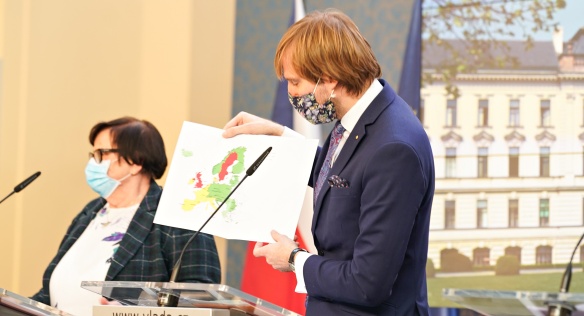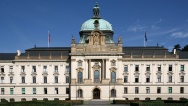Press Advisories
1. 6. 2020 20:51
Government provides millions in financial assistance to sports organisations. "Traffic-light" travel allowed
The COVID-Sport subsidy program was prepared by the National Sports Agency. The purpose of this program is to provide financial aid to organisers of sporting events, sports facility operators and sports organisations that have to pay rent for the sports facilities they use. These all suffered serious economic problems as a result of the Coronavirus pandemic when they had to cancel planned events, consequently losing all their income. As the vast majority are non-profit organisations, they have not been able to apply for assistance under any of the programs set up by the Government so far.
After preparation of the COVID-SPORT subsidy program was announced and taken into account by the Government, these institutions will be able to apply for this special subsidy from the state. The subsidy program will be administered by the National Sports Agency in collaboration with the State Environmental Fund of the Czech Republic, because the NSA does not have an electronic application system. The billion Czech Crowns approved for the program is to be provided equally by the Ministry of Education, Youth and Sports and the Government from the Government budget reserve. For more information about the program, visit National sporst agency´s website (in Czech language).
The Government also approved a draft amendment to the Trade Licensing Act for the purpose of assisting the tourism sector, specifically tour guides. Under the newly amended Trade Licensing Act (which is to enter into force on 1 November 2020), as of 1 January 2021 tour guides should prove their identity by way of a Czech national guide card. The Government will now propose a new amendment to Parliament to shift the date the Act becomes effective to 1 January 2020[2021?] and the guide-card obligation to 1 March 2021. Tour guides will thus have an extra three months in which to get the necessary permit at the Ministry for Regional Development after the Coronavirus epidemic ends.
The Ministers debated and took into account the Ministry of Health's special measures changing some of the restrictions that have been in place thus far. Starting Monday, 15 June, the current regime for cross-border travel will again be significantly relaxed. The Ministry of Health is now dividing the EU and other Schengen states into three categories. Using data from the European Centre for Disease Prevention and Control (ECDC), countries will be marked in green, orange or red according to the risk of infection. After this date Czechs and foreigners residing long-term in the Czech Republic will be able to travel to countries in all three categories, but upon returning from low- and medium-risk countries they will not have to show a negative Coronavirus test result. EU citizens travelling to the Czech Republic will not be obliged to provide proof of a test as long as they are from a low-risk country. Sweden and Great Britain are the only two countries that the Ministry included in the high-risk category. For more information, see the press release of the Ministry of Foreign Affairs (in Czech language).
One week earlier, from 8 June, some of the measures applying to Czech citizens and entrepreneurs are to be relaxed. For instance, it will be possible to organise public events for up to 500 persons; restaurant gardens will be allowed to stay open later than 11 p.m. without restrictions; it will be possible to try on clothing at markets; and more people will be allowed into zoos, botanical gardens, castle and palace grounds (250 persons per hectare), exhibition halls, castle and palace interiors and theatre, cinema, concert-hall and circus auditoriums (500 persons). Social distancing in auditoriums (every second row and seat) will also be cancelled. The Ministry is also cancelling the obligation for visitors to swimming pools and outdoor swimming pools to wear face masks as long as they observe social distancing and keep at least two metres away from other individuals. An overview of the Ministry of Health's special measures can be found at their website (in Czech language).
The Ministers also decided to terminate the rent moratorium. This moratorium was intended to protect tenants for the duration of the state of emergency, when viewing flats and moving were not possible. Considering that the restriction of free movement due to the epidemic has already been terminated, the Ministry of Finance believes there is no longer any reason to continue the moratorium. For more information, see the press release of the Ministry of Finance (in Czech language).
The Government also dealt with several legislative proposals. It approved the draft amendment to the Act on Certain Measures Against Money Laundering and Financing of Terrorism and the draft Act on Registration of Real Owners. Both cases involved transposition of European law: several directives and regulations against money laundering were adopted. Among other things, both these interconnected amendments comprehensively review the issue of combating money laundering and financing terrorism. For details about the amended Act on Certain Measures Against Money Laundering and Financing of Terrorism, see the press release of the Ministry of Finance (in Czech language).
The Ministers also debated five Parliamentary bills. They endorsed only one proposing to cancel the Criminal Register as a state organisational unit, saying that its factual agenda (i.e. keeping records of criminal convictions and misdemeanours and providing outputs from these records) should be carried out by the Ministry of Justice.
The Government also approved the new Government Principles for Providing Subsidies from the State Budget of the Czech Republic to Non-Governmental Non-Profit Organisations by Central State Administration Bodies. The wording of this regulation now makes it possible, among other things, to provide subsidies to non-governmental non-profit organisations not only for specific projects but also for their activities as such. The Government also cancelled the rule that limiting project subsidies to a maximum of 70%. It will now be possible to reimburse 100% of costs in eligible cases.
Useful information
- Hotline
Ministry of Transport
+420 225 131 820
Ministry of Industry nad Trade
+420 224 854 444
Ministry of Foreign Affairs
+420 224 183 200
Ministry of Interior (borders, security)
+420 739 608 533
Ministry of Education, Youth and Sports
+420 778 725 602
- Current information on Covid-19 caused by the Chinese coronavirus on the website of the Ministry of Health – information for citizens and healthcare workers, current data.
- Traveling During the State of Emergency
- The European coronavirus response team







